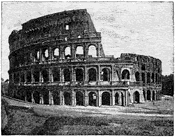

PISH-POSH FROM MY VIRTUAL SPACEby David EideThe Values That Emerge
|

Idle Musings of the Hypothetical Citizen
"Neither mechanical invention, nor political adroitness nor churches nor conventions nor civil service exams can save us from degeneration if the inner mystery be lost..." William James, The American Scene
The key, after all, was whether the liberal democracies had any dreams left.
It literally didn't matter one iota how shiny and advanced the machines were or how sophisticated the weapons and intelligence was: Without its soul, a liberal, democratic culture would die. It was never going to outstrip the natural law of entropy that drove all energy downward into chaos and dissipation.
It has had many dreams, including equity, a progressively better life for all, liberation of the self, exploration of space, among others. Most of these dreams came out of the seeds of individual minds and found a wonderful open field to grow in. The hypothetical citizen, not part of the collective political life or, while studying problems and the character of those who wanted responsibility, was led finally to the land of dreams. Where are the seeds? He thought it would be a thorough renovation of the energy system that would go toward solving resource and enivonmental problems. He wasn't sure about it. Good people kept that seed alive.
What dreams existed outside the framework of human vanity and greed?
He mused idly because the future would be found in no other place.
Perhaps busyness without substance was a greater danger than one imagined. The busyness tended to separate and isolate individuals from the currents that bind each other. In that space a primitive aggression took place that pitted one and all and destroyed every point of nourishment that needed to grow and come into its own.
"One must be prepared," he thought, "for the day when the effects seed the general population with the desire to change everything."
Reaction was expressed by the weakest link in the population.
There was a paradox in a large democracy. As institutions and individuals became images of the political process they were swept into political life against their will and without the proper tools or knowledge necessary to effectively approach political problems. Politics then became a cry of anguish, of personal debility, of social eccentricity that the politicians could deftly exploit.
And what form of government was secure and , like a perpetual machine, ran on and on?
The first legitimate question that he asked himself was, "is power authentic or not?" This was the crucial question since it was his consent that kept authority in its place.
On entering the question he was met by several problems. Reality seemed to defeat him at every turn. It leered at him and convinced him that neither his consent or non-consent is relevant. Sobered by this experience he quietly learned that all that was required of him was his vote and a few acceptable opinions to prove to everyone that he thought about his responsibilities.
It was no wonder, then, that criminal types, thugs, mediocre power hungry types rose to power and commanded the resources of the culture.
The worst division he could think of in a democratic society was a passive citizenry and an aggressive power hungry political class.
There was a kind of understanding of the world that reduced it in scope.
There was a moment when the world opened into splendid curiosity and discovery. At that moment, there was excellent potential for the types of people necessary for liberal, democracy.
Love and disinterest allowed the mind of a citizen to move from the region, among individuals and small groups, outward to the globe as a whole. A thousand and one activities, large and small, loose confederations of interest, some which seed the future, others that bloom and fade away. "Do not organize yourself so well and so quickly," the mind says on a sunny day when the world is a floating paradise of clouds. Huge projects managing huge projects makes for lousy democracies.
"Are your natural perceptions attached to the 'concerns of power?' and resolve in a variety of personalities, words, organizations, and a particular way of doing things?"
"Do you have a sense of perfection provided by the powers that be? So that you abolish what is imperfect in yourself while being re-shaped by the perfection of power?"
"Isn't it the imperative of the democratic citizen to become more knowledgeable than those who lead him or her? Politically, there are three forms of knowledge. Of the local, of the regional, of the national. The local could be called the family, the regional could be called the "gathering of interests", the national could be called the corporate."
© 2003 David Eide. All rights reserved.
David Eide
Back to Oasis